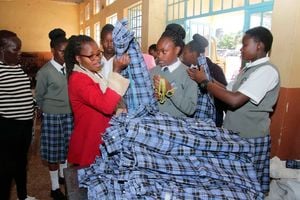
The motivation cash was cited by the Education Committee of the National Assembly as one of the catalysts of unhealthy competition in schools that also fuels examination malpractices.
Principals and teachers in public schools have designed tricks to beat government policy and illegally collect millions of shillings from parents in the guise of ‘motivation’ fees with the promise of better grades for their children.
Despite several circulars and directives outlawing the practice, the Ministry of Education has been unable to arrest the practice which places an extra burden on parents as well as pressure on learners. Parents who spoke to The Weekly Review told of the clandestine methods employed by schools to coerce them to part with the cash that is neither receipted nor audited.
The promise of good grades in national examinations makes parents with children in candidate classes part with the money with little or no complaining, unaware of the damage over-teaching and drilling has on the learners.
It is a case of the end justifies the means. Part of the problem is that the ministry lacks the capacity to discipline any teacher since they are employees of the Teachers Service Commission (TSC), an independent commission.
The motivation cash was earlier this year cited by the Education Committee of the National Assembly as one of the catalysts of unhealthy competition in schools that also fuel examination malpractices. Although the committee did not provide evidence, some stakeholders who appeared before it claimed that part of the money is used to compromise the integrity of national examinations. The Weekly Review has established that the vice is commonplace in most national and extra-county schools.
The charges for the extra lessons usually range from Sh2,000 to as high as Sh15,000 per child, per term and are collected outside the school financial system to avoid detection by auditors. National and extra-county schools have huge enrolments averaging between 1,500 learners to 2,000 which translates to colossal amounts.
The money is collected either through class teachers or parents associations who later hand it over to the teachers to share out as allowances or bonuses, depending on the number of lessons they teach. In some instances, the teachers go for holidays or teambuilding activities at the expense of the parents. In some instances, the illegal levies are first deducted when parents pay the official fees, thereby legitimising the balance they are left with.
While the programmes are presented as voluntary contributions, pressure is exerted on defaulters, thereby putting education out of reach of some children from humble backgrounds.
Parents who spoke to The Weekly Review equated it to extortion and questioned the rationale for the ‘motivation’ since teachers earn a salary just like other government employees. Loice Noo Okello, a psychologist and former teacher, observed that remedial lessons should ideally be incorporated into the standard learning process and not as an extra activity.
However, the existing approach by schools creates a division where these classes are frequently viewed as punitive, especially by students who are categorised by teachers as ‘struggling’ or ‘slow’.
Remote learning
“When students are labelled as needing remedial classes, it can feel like a punishment rather than an opportunity for growth. This stigma not only affects students’ self-esteem but also exacerbates their stress levels, leading to an increase in emotional disorders among the youth,” she said. The reality is compounded by the increasing academic workload students face, especially in the wake of remote learning transition. With online classes and an overload of homework, the pressure on learners to perform becomes relentless.
“The capacity of a young person’s mind is finite; piling on additional classes can lead to burnout. We are witnessing a rise in young people experiencing emotional disorders and stress-related issues, which is a growing concern. We are witnessing children having anxiety, depression, and headaches.
Many students are returning from school tired then they are overwhelmed by online classes and the heavy homework load. This places immense pressure on them, as the capacity of a young person’s mind can only handle so much.
It’s crucial to recognise that many students are struggling, and we must address their needs effectively,” she said.
The lack of oversight surrounding these transactions raises significant transparency and accountability queries. Parents are left in the dark about how the funds are allocated, as there is no audit or official accounting of the money collected.
“Sometimes, a different perspective can make all the difference, but this should not be at an additional cost or seen as a separate entity from their main education. The pressure to excel is creating a generation of students who feel overwhelmed and anxious, raising the question of how educational practices can be reformed to better support mental health alongside academic achievement,” said Ms Noo.
The illegal motivation fees have opened up a leeway for school administrations to levy other charges outside the officially sanctioned fee structures. Parents are often left with little choice but to comply, as schools leverage the financial pressures they face to justify these fees.
The fees are typically divided into two categories: Remedial classes and school development. While schools insist these contributions are voluntary, many parents feel they have no alternative but to pay, fearing their children may be denied essential services or academic support.
At Dagoretti High School, for example, parents pay a total of Sh5,000 per student, per term, with a significant portion of the money intended for teachers’ bonuses. The parents often collect the money through their representatives in the Parents Association and hand it over to the teachers in cash, avoiding any money trail linking the school to the collections.
The practice not only circumvents official channels but also fosters an environment where financial obligations are blurred with educational expectations. The money is collected purely on trust and the lack of oversight and accountability increases the potential for misappropriation of funds collected from the public.
“Besides the school fees we already pay, we’re also expected to cover additional fees for remedial classes and development, which is overwhelming for the students and parents. The government has banned remedial classes, but the pressure on our children is mounting. With the workload increasing, many children are experiencing mental breakdowns. And for families with two or three children, the financial burden is even greater,” said a parent with a son at the school.
At Starehe Boys Centre, parents face a mandatory Sh2,000 fee each term for remedial classes, purportedly aimed at providing extra academic support.
“We pay Sh2,000 each term, and we’re informed that the programme mainly focuses on reinforcing key concepts, enhancing skills, and preparing students for examinations. This amount is required every term when students return to school,” he said.
In 2023, then-Cabinet Secretary for Education Ezekiel Machogu announced a ban on extra morning and evening lessons, along with the abolition of remedial lessons, stating that they lead to ‘unnecessary struggles’ for students.
School principals, however, blame the government for inadequate financing that forces them to look for money from other sources including the extra levies. According to the Kenya Secondary Schools Heads Association, capitation under the Free Day Secondary School Education (FDSE) has fallen from the Sh22,244 per learner annually set in 2018 to Sh15,192, despite a significant increase in student enrollment.
School policies
According to data at the ministry, the current allocation of Sh54 billion for the FDSE is only sufficient to fully support 3.2 million students, leaving a substantial gap as the actual number of enrolled learners in secondary schools stands at 4.2 million.
The National Parents Association (NPA) chairperson Silas Obuhatsa noted that despite government directives, some institutions continue to impose additional levies under the guise of remedial programmes.
Mr Obuhatsa blames parents for agreeing to pay these levies without questioning their legitimacy. “Parents must be trained on how to access and interpret school policies. This includes understanding why they’re paying certain fees and ensuring that these payments align with government directives. Parents need to be empowered to make informed decisions and not be left under the ‘blanket’ of misinformation or fear of victimisation,” he said.
While parental involvement is essential for a child’s educational success, the burden of illegal fees is unfairly placed on families, he observed. “We need to find a balance where parents can support their children without being financially exploited,” said Mr Obuhatsa.
He emphasized that the responsibility lies with the parents who own schools in their communities.
“Before any school imposes charges on parents or extra levies, they have meetings where school teachers, management, and parents are invited to discuss these issues. Parents are well-informed about the government’s ban on illegal payments. The schools don’t impose this on us; we sign and accept these charges.” The collaborative nature of education is also under scrutiny. Students who struggle to connect with their primary teachers may find solace in remedial classes led by different educators, where they might receive a fresh approach.










